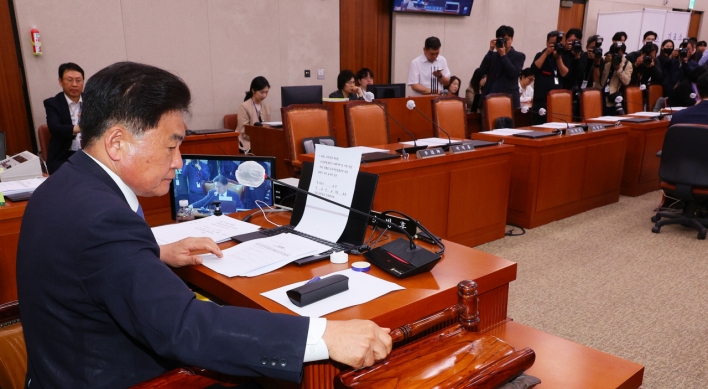[Peter Singer] In defense of the art-targeting climate activists
By Korea Herald PhotoPublished : Jan. 10, 2023 - 05:33

Last July, two activists from Just Stop Oil entered London’s National Gallery and made their way to John Constable’s “The Hay Wain,” an iconic painting of rural England as it was 200 years ago. After covering the painting with an image of environmental destruction, they glued their hands to the frame and awaited arrest.
Three months later, another pair of activists went to the National Gallery and threw tomato soup at Vincent van Gogh’s “Sunflowers.” In the Netherlands, one activist glued his head to Johannes Vermeer’s “Girl with a Pearl Earring,” while another poured something red over him. In Vienna, members of Last Generation, an organization named to make the point that we are the last generation able to prevent catastrophic climate change, poured black oily liquid over Gustav Klimt’s “Death and Life.” And in Potsdam, others smeared mashed potatoes onto Claude Monet’s “Haystacks.”
In all these incidents, the activists chose paintings protected by glass, drawing attention to great works of art, but not damaging them. With “The Hay Wain,” the message was that if we do not stop using fossil fuels, scenes like the one Constable painted will be gone forever.
The title of the Klimt reminds us that climate change is a life-and-death issue. The activists used the “Girl with a Pearl Earring” to challenge our values, asking the shocked onlookers how they felt when they saw the beautiful painting apparently being ruined. “Do you feel outraged?” they asked -- and then answered their own question, “Good. Where is that feeling when you see the planet being destroyed before your very eyes?”
We value art, but what we stand to lose from climate change is incomparably more significant. Everything we value on this planet is at stake, including the continuity of both human and non-human life. Why, then, do many people support the goal of stronger action against climate change, yet oppose the actions taken by Just Stop Oil and Last Generation?
It’s happened before. Martin Luther King, Jr.’s “Letter from Birmingham Jail” is a response to eight white clergymen who, writing in a Birmingham, Alabama, newspaper, had agreed with King’s goals, but not with his “extreme” actions (which were entirely non-violent). They urged King to wait patiently for “a more convenient season.” King replied that he found this lukewarm acceptance “more bewildering than outright rejection.” Eco-activists may experience a similar bewilderment when they are criticized by people who say that they share their goals but object to their non-violent attempts, which, while taking care to avoid damaging the art, seek to raise awareness of the importance of avoiding fossil fuels.
We honor many protesters, past and present, who broke the law to advance a good cause. Suffragettes targeted great art in their struggle to obtain votes for women, and, unlike today’s eco-activists, deliberately slashed paintings. Today, however, we regard them as heroic feminist pioneers. In the United States, King’s birthday is a federal holiday. We support the courageous women of Iran in their protests against the theocracy there. And yet we do not also support non-violent protests against government policies that are manifestly insufficient to achieve the goal, embodied in the 2015 Paris climate agreement, of limiting global warming to 2 degrees Celsius, and preferably 1.5 degrees Celsius, above pre-industrial levels?
In seeking a conviction against the people who glued their hands to the frame of “The Hay Wain,” the prosecutor sought to distinguish the actions of the suffragettes from those of the activists on trial by saying that the former “had no democratic means by which they could further their cause,” whereas today “We have an established democracy.”
Yet activists for climate change have a powerful response to this argument. Today, it seems self-evident that democracy requires allowing women to vote, but not much more than a century ago, conservatives argued that women had no need to vote because their interests were already protected by their husbands or fathers. We laugh at that argument now, but we may be equally blind to serious flaws in our own democracies.
Ask yourself who will suffer the most if we fail to prevent catastrophic climate change. The answer is the young and those yet to be born -- both categories unrepresented in our political systems. In “Justice Across Ages,” Juliana Uhuru Bidadanure, a professor at Stanford University, cites statistics showing that even among people old enough to vote, those aged 18-35 are significantly unrepresented in legislatures. In the US, this bias against the young is built into the constitution, which restricts membership of the House of Representatives and the Senate to those who are at least 25 and 30 years old, respectively, and the US president may not be younger than 35.
For countries that do not have constitutional barriers against younger legislators, Bidadanure suggests a remedy. Following the example of countries that have quotas to ensure a voice for indigenous people, or other minorities, we could have quotas for younger people. Thomas Wells, of the Leiden Institute for Philosophy, has suggested electing representatives who serve as trustees for future generations. And, of course, we could lower the voting age, to 16 or even lower.
In the absence of any such measures, eco-activists can properly claim that their non-violent civil disobedience is justified by the failure of our democracies to show sufficient concern for the interests of future generations. Like the suffragettes more than a century ago, today’s young people have no voice.
Peter Singer
Peter Singer, professor of bioethics at Princeton University, is founder of the charity The Life You Can Save. -- Ed.
(Project Syndicate)
-
Articles by Korea Herald Photo










![[Kim Seong-kon] Democracy and the future of South Korea](http://res.heraldm.com/phpwas/restmb_idxmake.php?idx=644&simg=/content/image/2024/04/16/20240416050802_0.jpg&u=)








![[Today’s K-pop] Zico drops snippet of collaboration with Jennie](http://res.heraldm.com/phpwas/restmb_idxmake.php?idx=642&simg=/content/image/2024/04/18/20240418050702_0.jpg&u=)